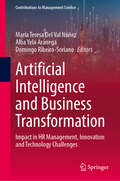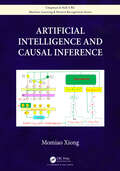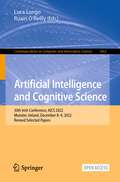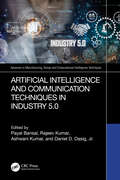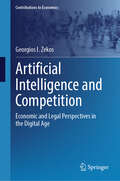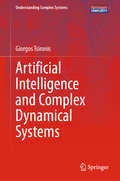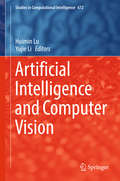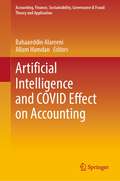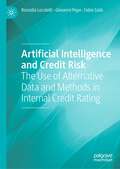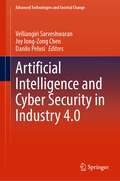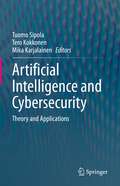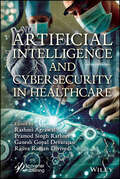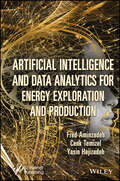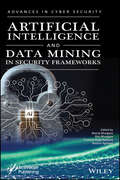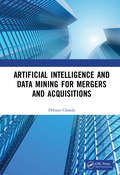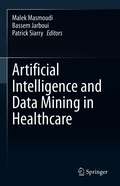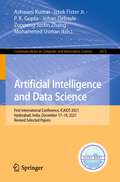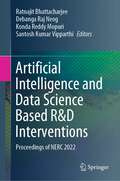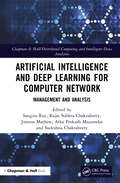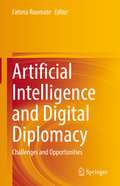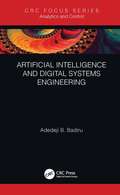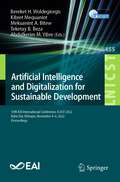- Table View
- List View
Artificial Intelligence and Business Transformation: Impact in HR Management, Innovation and Technology Challenges (Contributions to Management Science)
by María Teresa Del Val Núñez Alba Yela Aránega Domingo Ribeiro-SorianoThis book offers a current perspective on Artificial Intelligence in the context of an ever-changing and growing technological revolution in business management. It analyses how existing companies are adapting, new ones are emerging, and others are disappearing. Process re-engineering has made it possible to reshape organizational structures and create new departments and positions, all geared towards digitalization. The emergence of new business functions has led to new strategic thinking on e.g. companies’ structure, size, and core business – but also to the creation of new jobs, the need to cover digital skills, and the need for innovative team management. In short, it is a question of delving deeper into HR and the impact that digitalization has had on it, as the employee is one of the key figures to protect. The book initially focuses on providing a review of the current literature on the advancement of Artificial Intelligence and its impact on business transformation and the emergence of new management models. In turn, it addresses the diverse perspectives that currently dominate the business market, as well as the corporate transformations that have taken place in the post-pandemic era. Lastly, it equips employers with new tools to incorporate into their organizations, facilitating talent retention. In connection with HR, this digital transformation is reflected in new roles for change management and cultural transformation, including the use of digital technologies to improve the employee experience. In brief, the book offers a practical guide to business transformation, technological advances, and their application in human resources departments.
Artificial Intelligence and Causal Inference
by Momiao XiongArtificial Intelligence and Causal Inference address the recent development of relationships between artificial intelligence (AI) and causal inference. Despite significant progress in AI, a great challenge in AI development we are still facing is to understand mechanism underlying intelligence, including reasoning, planning and imagination. Understanding, transfer and generalization are major principles that give rise intelligence. One of a key component for understanding is causal inference. Causal inference includes intervention, domain shift learning, temporal structure and counterfactual thinking as major concepts to understand causation and reasoning. Unfortunately, these essential components of the causality are often overlooked by machine learning, which leads to some failure of the deep learning. AI and causal inference involve (1) using AI techniques as major tools for causal analysis and (2) applying the causal concepts and causal analysis methods to solving AI problems. The purpose of this book is to fill the gap between the AI and modern causal analysis for further facilitating the AI revolution. This book is ideal for graduate students and researchers in AI, data science, causal inference, statistics, genomics, bioinformatics and precision medicine. Key Features: Cover three types of neural networks, formulate deep learning as an optimal control problem and use Pontryagin’s Maximum Principle for network training. Deep learning for nonlinear mediation and instrumental variable causal analysis. Construction of causal networks is formulated as a continuous optimization problem. Transformer and attention are used to encode-decode graphics. RL is used to infer large causal networks. Use VAE, GAN, neural differential equations, recurrent neural network (RNN) and RL to estimate counterfactual outcomes. AI-based methods for estimation of individualized treatment effect in the presence of network interference.
Artificial Intelligence and Cognitive Science: 30th Irish Conference, AICS 2022, Munster, Ireland, December 8–9, 2022, Revised Selected Papers (Communications in Computer and Information Science #1662)
by Luca Longo Ruairi O’ReillyThis open access book constitutes selected papers presented during the 30th Irish Conference on Artificial Intelligence and Cognitive Science, held in Munster, Ireland, in December 2022. The 41 presented papers were thoroughly reviewed and selected from the 102 submissions. They are organized in topical sections on machine learning, deep learning and applications; responsible and trustworthy artificial intelligence; natural language processing and recommender systems; knowledge representation, reasoning, optimisation and intelligent applications.
Artificial Intelligence and Communication Techniques in Industry 5.0 (Advances in Manufacturing, Design and Computational Intelligence Techniques)
by Payal Bansal Rajeev Kumar Ashwani Kumar Daniel D. DasigThe book highlights the role of artificial intelligence in driving innovation, productivity, and efficiency. It further covers applications of artificial intelligence for digital marketing in Industry 5.0 and discusses data security and privacy issues in artificial intelligence, risk assessments, and identification strategies.This book: Discusses the role of artificial intelligence applications for digital manufacturing in Industry 5.0 Presents blockchain methods and data-driven decision-making with autonomous transportation Covers reinforcement learning algorithm and highly predicted models for accurate data analysis in industry automation Highlights the importance of robust authentication mechanisms and access control policies to protect sensitive information, prevent unauthorized access, and enable secure interactions between humans and machines Explains attack pattern detection and prediction which play a crucial role in ensuring the security of business systems and networks It is primarily written for senior undergraduates, graduate students, and academic researchers in the fields of electrical engineering, electronics and communication engineering, computer engineering, industrial engineering, manufacturing engineering, and production engineering.
Artificial Intelligence and Competition: Economic and Legal Perspectives in the Digital Age (Contributions to Economics)
by Georgios I. ZekosThis book examines the impact of artificial intelligence on competition and antitrust in today's global digital economy. It scrutinizes the economic and legal ramifications of Artificial Intelligence (AI), addressing the challenges it presents to competition and the law.Beginning with an analysis of AI's developments across various economic sectors, the book highlights the need for updated legislation. It focuses on the digital economy, emphasizing digital platforms' role in shaping competition. Econometric investigations and a novel index assess competition's influence on foreign direct investment and multinational enterprises. Comparing competition practices across jurisdictions like the EU, US, Germany, and China, the book uncovers commonalities and differences in competition law principles. It also explores various theories on competition and competition law, seeking convergence or divergence.This book is an essential resource for scholars, legal professionals, policymakers, and anyone seeking a better understanding of how AI is reshaping competition and antitrust in the digital age.
Artificial Intelligence and Complex Dynamical Systems (Understanding Complex Systems)
by Giorgos TsironisThis book serves as a comprehensive introduction to nonlinear complex systems through the application of machine learning methods. Artificial intelligence (AI) has affected the foundations of scientific discovery, and can therefore lend itself to developing a better understanding of the unpredictable nature of complex dynamical systems and to predict their future evolution. Utilizing Python code, this book teaches and applies machine learning to topics such as chaotic dynamics and time-series analysis, solitons, breathers, chimeras, nonlinear localization, biomolecular dynamics, and wave propagation in the heart. The consistent integration of methods and models allow for readers to develop a necessary intuition on how to handle complexity through AI. This textbook contains a wealth of expository material, code, and example problems to support and organize academic coursework, allowing the technical nature of these areas of study to become highly accessible. Requiring only a basic background in mathematics and coding in Python, this book is an essential text for a wide array of advanced undergraduate or graduate students in the applied sciences interested in complex systems through the lens of machine learning.
Artificial Intelligence and Computer Vision (Studies in Computational Intelligence #672)
by Huimin Lu Yujie LiThis edited book presents essential findings in the research fields of artificial intelligence and computer vision, with a primary focus on new research ideas and results for mathematical problems involved in computer vision systems. The book provides an international forum for researchers to summarize the most recent developments and ideas in the field, with a special emphasis on the technical and observational results obtained in the past few years.
Artificial Intelligence and Conservation (Artificial Intelligence for Social Good)
by Fei Fang Milind Tambe Bistra Dilkina Andrew J. PlumptreWith the increasing public interest in artificial intelligence (AI), there is also increasing interest in learning about the benefits that AI can deliver to society. This book focuses on research advances in AI that benefit the conservation of wildlife, forests, coral reefs, rivers, and other natural resources. It presents how the joint efforts of researchers in computer science, ecology, economics, and psychology help address the goals of the United Nations' 2030 Agenda for Sustainable Development. Written at a level accessible to conservation professionals and AI researchers, the book offers both an overview of the field and an in-depth view of how AI is being used to understand patterns in wildlife poaching and enhance patrol efforts in response, covering research advances, field tests and real-world deployments. The book also features efforts in other major conservation directions, including protecting natural resources, ecosystem monitoring, and bio-invasion management through the use of game theory, machine learning, and optimization.
Artificial Intelligence and COVID Effect on Accounting (Accounting, Finance, Sustainability, Governance & Fraud: Theory and Application)
by Bahaaeddin Alareeni Allam HamdanThis book considers the effects of COVID-19 on accounting, particularly with regard to the role of artificial intelligence in accounting in the post-pandemic business environment. The contributions in the book consider a variety of sectors that have been affected by the pandemic, such as the stock market, forensic accounting, Bitcoin, as well as the economic and educational responses to the pandemic and the aftermath felt by both developing and developed countries. This book will be a valuable read for academics, students and practitioners of accounting who are keen to explore the future of the field in light of the pandemic.
Artificial Intelligence and Credit Risk: The Use of Alternative Data and Methods in Internal Credit Rating
by Rossella Locatelli Giovanni Pepe Fabio SalisThis book focuses on the alternative techniques and data leveraged for credit risk, describing and analysing the array of methodological approaches for the usage of techniques and/or alternative data for regulatory and managerial rating models. During the last decade the increase in computational capacity, the consolidation of new methodologies to elaborate data and the availability of new information related to individuals and organizations, aided by the widespread usage of internet, set the stage for the development and application of artificial intelligence techniques in enterprises in general and financial institutions in particular. In the banking world, its application is even more relevant, thanks to the use of larger and larger data sets for credit risk modelling. The evaluation of credit risk has largely been based on client data modelling; such techniques (linear regression, logistic regression, decision trees, etc.) and data sets (financial, behavioural, sociologic, geographic, sectoral, etc.) are referred to as “traditional” and have been the de facto standards in the banking industry. The incoming challenge for credit risk managers is now to find ways to leverage the new AI toolbox on new (unconventional) data to enhance the models’ predictive power, without neglecting problems due to results’ interpretability while recognizing ethical dilemmas. Contributors are university researchers, risk managers operating in banks and other financial intermediaries and consultants. The topic is a major one for the financial industry, and this is one of the first works offering relevant case studies alongside practical problems and solutions.
Artificial Intelligence and Cyber Security in Industry 4.0 (Advanced Technologies and Societal Change)
by Velliangiri Sarveshwaran Joy Iong-Zong Chen Danilo PelusiThis book provides theoretical background and state-of-the-art findings in artificial intelligence and cybersecurity for industry 4.0 and helps in implementing AI-based cybersecurity applications. Machine learning-based security approaches are vulnerable to poison datasets which can be caused by a legitimate defender's misclassification or attackers aiming to evade detection by contaminating the training data set. There also exist gaps between the test environment and the real world. Therefore, it is critical to check the potentials and limitations of AI-based security technologies in terms of metrics such as security, performance, cost, time, and consider how to incorporate them into the real world by addressing the gaps appropriately. This book focuses on state-of-the-art findings from both academia and industry in big data security relevant sciences, technologies, and applications.
Artificial Intelligence and Cybersecurity: Advances and Innovations (Green Engineering and Technology)
by Ishaani Priyadarshini and Rohit SharmaArtificial intelligence and cybersecurity are two emerging fields that have made phenomenal contributions toward technological advancement. As cyber-attacks increase, there is a need to identify threats and thwart attacks. This book incorporates recent developments that artificial intelligence brings to the cybersecurity world. Artificial Intelligence and Cybersecurity: Advances and Innovations provides advanced system implementation for Smart Cities using artificial intelligence. It addresses the complete functional framework workflow and explores basic and high-level concepts. The book is based on the latest technologies covering major challenges, issues and advances, and discusses intelligent data management and automated systems. This edited book provides a premier interdisciplinary platform for researchers, practitioners and educators. It presents and discusses the most recent innovations, trends and concerns as well as practical challenges and solutions adopted in the fields of artificial intelligence and cybersecurity.
Artificial Intelligence and Cybersecurity: Theory and Applications
by Tuomo Sipola Tero Kokkonen Mika KarjalainenThis book discusses artificial intelligence (AI) and cybersecurity from multiple points of view. The diverse chapters reveal modern trends and challenges related to the use of artificial intelligence when considering privacy, cyber-attacks and defense as well as applications from malware detection to radio signal intelligence.The chapters are contributed by an international team of renown researchers and professionals in the field of AI and cybersecurity.During the last few decades the rise of modern AI solutions that surpass humans in specific tasks has occurred. Moreover, these new technologies provide new methods of automating cybersecurity tasks. In addition to the privacy, ethics and cybersecurity concerns, the readers learn several new cutting edge applications of AI technologies.Researchers working in AI and cybersecurity as well as advanced level students studying computer science and electrical engineering with a focus on AI and Cybersecurity will find this book useful as a reference. Professionals working within these related fields will also want to purchase this book as a reference.
Artificial Intelligence and Cybersecurity in Healthcare
by Rashmi Agrawal Pramod Singh Rathore Ganesh Gopal Devarajan Rajiva Ranjan DivivediArtificial Intelligence and Cybersecurity in Healthcare provides a crucial exploration of AI and cybersecurity within healthcare Cyber Physical Systems (CPS), offering insights into the complex technological landscape shaping modern patient care and data protection. As technology advances, healthcare has transformed, particularly through the implementation of CPS that integrate the digital and physical worlds, enhancing system efficiency and effectiveness. This increased reliance on technology raises significant security concerns. The book addresses the integration of AI and cybersecurity in healthcare CPS, detailing technological advancements, applications, and the challenges they present. AI applications in healthcare CPS include remote patient monitoring, AI chatbots for patient assistance, and biometric authentication for data security. AI not only improves patient care and clinical decision-making by analyzing extensive data and optimizing treatment plans, but also enhances CPS security by detecting and responding to cyber threats. Nonetheless, AI systems are susceptible to attacks, emphasizing the need for robust cybersecurity. Significant issues include the privacy and security of sensitive healthcare data, potential identity theft, and medical fraud from data breaches, alongside ethical concerns such as algorithmic bias. As the healthcare industry becomes increasingly digital and data-driven, integrating AI and cybersecurity measures into CPS is essential. This requires collaboration among healthcare providers, tech vendors, regulatory bodies, and cybersecurity experts to develop best practices and standards. This book aims to provide a comprehensive understanding of AI, cybersecurity, and healthcare CPS. It explores technologies like augmented reality, blockchain, and the Internet of Things, addressing associated challenges like cybersecurity threats and ethical dilemmas.
Artificial Intelligence and Data Analytics for Energy Exploration and Production
by Fred Aminzadeh Cenk Temizel Yasin HajizadehARTIFICAL INTELLIGENCE AND DATA ANALYTICS FOR ENERGY EXPLORATION AND PRODUCTION This groundbreaking new book is written by some of the foremost authorities on the application of data science and artificial intelligence techniques in exploration and production in the energy industry, covering the most comprehensive and updated new processes, concepts, and practical applications in the field. The book provides an in-depth treatment of the foundations of Artificial Intelligence (AI) Machine Learning, and Data Analytics (DA). It also includes many of AI-DA applications in oil and gas reservoirs exploration, development, and production. The book covers the basic technical details on many tools used in “smart oil fields”. This includes topics such as pattern recognition, neural networks, fuzzy logic, evolutionary computing, expert systems, artificial intelligence machine learning, human-computer interface, natural language processing, data analytics and next-generation visualization. While theoretical details will be kept to the minimum, these topics are introduced from oil and gas applications viewpoints. In this volume, many case histories from the recent applications of intelligent data to a number of different oil and gas problems are highlighted. The applications cover a wide spectrum of practical problems from exploration to drilling and field development to production optimization, artificial lift, and secondary recovery. Also, the authors demonstrate the effectiveness of intelligent data analysis methods in dealing with many oil and gas problems requiring combining machine and human intelligence as well as dealing with linguistic and imprecise data and rules.
Artificial Intelligence and Data Mining Approaches in Security Frameworks (Advances in Data Engineering and Machine Learning)
by Neeraj Bhargava Ritu Bhargava Pramod Singh Rathore Rashmi AgrawalArtificial intelligence (AI) and data mining is the fastest growing field in computer science. AI and data mining algorithms and techniques are found to be useful in different areas like pattern recognition, automatic threat detection, automatic problem solving, visual recognition, fraud detection, detecting developmental delay in children, and many other applications. However, applying AI and data mining techniques or algorithms successfully in these areas needs a concerted effort, fostering integrative research between experts ranging from diverse disciplines from data science to Artificial Intelligence. Successful application of security frameworks to enable meaningful, cost effective, personalize security service is a primary aim of engineers and researchers today. However realizing this goal requires effective understanding, application and amalgamation of AI and Data Mining and several other computing technologies to deploy such system in an effective manner. This book provides state of the art approaches of artificial intelligence and data mining in these areas. It includes areas of detection, prediction, as well as future framework identification, development, building service systems and analytical aspects. In all these topics, applications of AI and data mining, such as artificial neural networks, fuzzy logic, genetic algorithm and hybrid mechanisms, are explained and explored. This book is aimed at the modeling and performance prediction of efficient security framework systems, bringing to light a new dimension in the theory and practice. This groundbreaking new volume presents these topics and trends, bridging the research gap on AI and data mining to enable wide-scale implementation. Whether for the veteran engineer or the student, this is a must-have for any library.
Artificial Intelligence and Data Mining for Mergers and Acquisitions
by Debasis ChandaThe goal of this book is to present a modeling framework for the Virtual Organization that is focused on process composition. This framework uses Predicate Calculus Knowledge Bases. Petri Net-based modeling is also discussed. In this context, a Data Mining model is proposed, using a fuzzy mathematical approach, aiming to discover knowledge. A Knowledge-Based framework has been proposed in order to present an all-inclusive knowledge store for static and dynamic properties. Toward this direction, a Knowledge Base is created, and inferences are arrived at. This book features an advisory tool for Mergers and Acquisitions of Organizations using the Fuzzy Data Mining Framework and highlights the novelty of a Knowledge-Based Service-Oriented Architecture approach and development of an Enterprise Architectural model using AI that serves a wide audience. Students of Strategic Management in business schools and postgraduate programs in technology institutes seeking application areas of AI and Data Mining, as well as business/technology professionals in organizations aiming to create value through Mergers and Acquisitions and elsewhere, will benefit from the reading of this book.
Artificial Intelligence and Data Mining in Healthcare
by Malek Masmoudi Bassem Jarboui Patrick SiarryThis book presents recent work on healthcare management and engineering using artificial intelligence and data mining techniques. Specific topics covered in the contributed chapters include predictive mining, decision support, capacity management, patient flow optimization, image compression, data clustering, and feature selection.The content will be valuable for researchers and postgraduate students in computer science, information technology, industrial engineering, and applied mathematics.
Artificial Intelligence and Data Science: First International Conference, ICAIDS 2021, Hyderabad, India, December 17–18, 2021, Revised Selected Papers (Communications in Computer and Information Science #1673)
by Ashwani Kumar Iztok Fister Jr. P. K. Gupta Johan Debayle Zuopeng Justin Zhang Mohammed UsmanThis book constitutes selected papers presented at the First International Conference on Artificial Intelligence and Data Science, ICAIDS 2021, held in Hyderabad, India, in December 2021. The 43 papers presented in this volume were thoroughly reviewed and selected from the 195 submissions. They focus on topics of artificial intelligence for intelligent applications and data science for emerging technologies.
Artificial Intelligence and Data Science Based R&D Interventions: Proceedings of NERC 2022
by Ratnajit Bhattacharjee Debanga Raj Neog Konda Reddy Mopuri Santosh Kumar VipparthiThis book title is a composition of multiple research efforts that are based on cutting-edge Artificial Intelligence (AI) techniques. Some of the signal processing problems are addressed with techniques from the broad areas of machine learning and deep learning.
Artificial Intelligence and Deep Learning for Computer Network: Management and Analysis (Chapman & Hall/Distributed Computing and Intelligent Data Analytics)
by Sangita Roy Rajat Subhra Chakraborty Jimson Mathew Arka Prokash Mazumdar Sudeshna ChakrabortyArtificial Intelligence and Deep Learning for Computer Network: Management and Analysis aims to systematically collect quality research spanning AI, ML, and deep learning (DL) applications to diverse sub-topics of computer networks, communications, and security, under a single cover. It also aspires to provide more insights on the applicability of the theoretical similitudes, otherwise a rarity in many such books. Features: A diverse collection of important and cutting-edge topics covered in a single volume. Several chapters on cybersecurity, an extremely active research area. Recent research results from leading researchers and some pointers to future advancements in methodology. Detailed experimental results obtained from standard data sets. This book serves as a valuable reference book for students, researchers, and practitioners who wish to study and get acquainted with the application of cutting-edge AI, ML, and DL techniques to network management and cyber security.
Artificial Intelligence and Digital Diplomacy: Challenges and Opportunities
by Fatima RoumateThis volume discusses digital diplomacy and artificial intelligence within the context of global governance and international security. Rapid digitalization has changed the way international actors interact, offering new opportunities for international and bilateral cooperation and reinforcing the role of the emergent actors within global governance. New phenomena linked to digitalization and artificial intelligence are emerging and this volume brings a multidisciplinary, mixed-methods approach to studying them. Written by globally recognized experts, each chapter presents a case study covering an emerging topic such as: international regulation of the web and digital diplomacy, the interplay of artificial intelligence and cyber diplomacy, social media and artificial intelligence as tools for digital diplomacy, the malicious use of artificial intelligence, cyber security, and data sovereignty. Incorporating both theory and practice, quantitative and qualitative analysis, this volume will be of interest to graduate students and researchers in international relations, diplomacy, security studies, and artificial intelligence, as well as diplomats and policymakers looking to understand the implications of digitalization and artificial intelligence in their fields.
Artificial Intelligence and Digital Systems Engineering (Analytics and Control)
by Adedeji B. BadiruThe resurgence of artificial intelligence has been fueled by the availability of the present generation of high-performance computational tools and techniques. This book is designed to provide introductory guidance to artificial intelligence, particularly from the perspective of digital systems engineering. Artificial Intelligence and Digital Systems Engineering provides a general introduction to the origin of AI and covers the wide application areas and software and hardware interfaces. It will prove to be instrumental in helping new users expand their knowledge horizon to the growing market of AI tools, as well as showing how AI is applicable to the development of games, simulation, and consumer products, particularly using artificial neural networks. This book is for the general reader, university students, and instructors of industrial, production, civil, mechanical, and manufacturing engineering. It will also be of interest to managers of technology, projects, business, plants, and operations.
Artificial Intelligence and Digital Twin Technology: 1st International Conference, IconAIDTT 2023, Sivakasi, India, April 26–28, 2023, Proceedings (Communications in Computer and Information Science #1972)
by Valarmathi K. Ramathilagam A. Sankarganesh Seeni Utku Kose Bui Thanh Hung Kottilingam KottursamyThis book constitutes papers from the 1st International Conference on Artificial Intelligence and Digital Twin Technology, IconAIDTT 2023, held in Sivakasi, India, April 26–28, 2023. The 12 full papers and the 1 short paper included in this volume were carefully reviewed and selected from 41 submissions. The papers cover the following topics: Advanced AI and IoT Solutions for Environmental, Healthcare, and Security Challenges; Deep Learning Techniques for Wireless networks and Data Analysis.
Artificial Intelligence and Digitalization for Sustainable Development: 10th EAI International Conference, ICAST 2022, Bahir Dar, Ethiopia, November 4-6, 2022, Proceedings (Lecture Notes of the Institute for Computer Sciences, Social Informatics and Telecommunications Engineering #455)
by Bereket H. Woldegiorgis Kibret Mequanint Mekuanint A. Bitew Teketay B. Beza Abdulkerim M. YibreThis proceedings, ICAST 2022, constitutes the refereed post-conference proceedings of the 10th International Conference on Advancement of Science and Technology, ICAST 2022, which took place in Bahir Dar, Ethiopia, in November 2022. The 17 revised full papers and one short paper were carefully reviewed and selected from 174 submissions. The papers present economic and technologic developments in modern societies related to important issues such digitization, energy transformation, impact on national economy, and its recent advancements.
